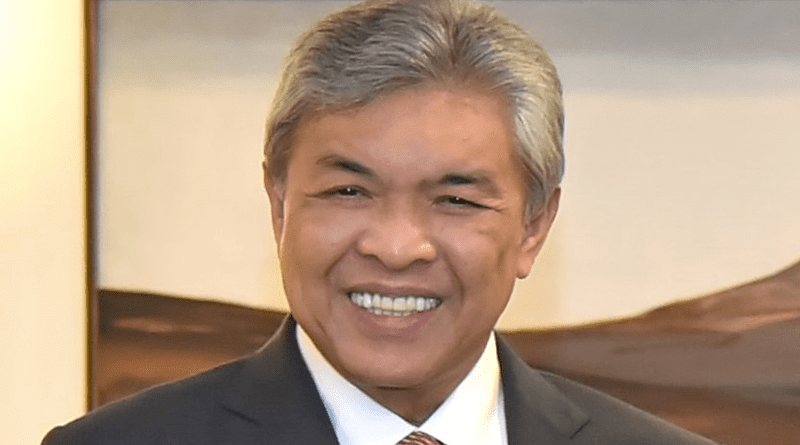Malaysia: High Probability Zahid Will Become Next Prime Minister – Analysis
Manoeuvrings, likely results, and possible scenarios support this
A number of arising factors over the last week has made it highly probable that UMNO president Ahmad Zahid Hamidi will become the next prime minister after the general election is concluded on November 19.
The Barisan Nasion’s decision to drop a number of incumbents from their candidate list means caretaker prime minister Ismail Sabri Yaakob will have few allies sitting with him in the new parliament to support his name to the Agong, or king as prime minister.
The key here is that under the Malaysian Constitution, and long precedented convention, the Agong is entitled to call for multiple names as candidate for prime minister, where he may select one who he believes can command support from the majority of MPs in the house.
Among those MPs, who were considered allies of Ismail Sabri that have been dropped from the electoral candidate list by Zahid include, Shahidan Kassim (Arau), Annuar Musa (Ketereh), Halimah Sadique (Kota Tinggi), Dr Adhum Baba (Tenggara), and Zahidi Zainal Abidin (Padang Besar).
Pro-Ismail Sabri candidates like Khairy Jamaluddin has been moved away from his seat of Renbau to make room for a strong Zahid supporter and deputy president of UMNO, Muhamad Hasan, known as Tok Mat. Khairy is forced to stand in the safe opposition seat in Sungai Buloh, which will be challenging for him to win.
Other Ismail Sabri supporters like Mustapa Mohamed (Jeli), an UMNO defector to Bersatu after the last election, have declared they will stand down this election. It is also expected that much of Ismail Sabri’s cabinet support based from Bersatu will lose their seats back to UMNO, this time round.
Should UMNO win the November 19 general election, and form a coalition with another party of grouping, then Zahid will be in a very strong position as UMNO party president, with an increased number of supporting MPs to back his candidacy as prime minister to the Agong.
May not be straight forward
The Agong could, as many Sultans in the states have done, ask for three candidates for the position of chief minister. This would provide the Agong with some discretion to select one of those names, should he decide to go down that path. There is precedent for this in Perlis, Selangor, Johor, and Terengganu.
Alternatively, if UMNO only has a slim majority, then a small number of UMNO MPs loyal to Ismail Sabri could suggest an alternative candidate to Zahid. In an extreme scenario, they could defect to the opposition and tip the election.
This would be seen as mutiny within UMNO, a line most would fear to cross. Highly improbable, but not impossible.
It all depends on how the numbers stack up
During these early stages of the election campaign, basing the following scenario on the last three state elections, Sarawak, Melaka, and Johor, UMNO is set for a massive win on November 19. In the 2018 general election, the BN won only 60 seats, and lost around 13 seats to Bersatu with defections. These are seats UMNO considers are theirs and will work hard to win them back.
Currently, it is looking like Bersatu will be nearly wiped out, as will be Mahathir’s Pejuang. The exception will probably be Mahathir himself in Langkawi, and his son Mukhriz in neighbouring Jerlun, may just hang on. GPS from Sarawak, which is expected to gain from the 19 seats it won in 2018, will most probably join the BN, as will UMNO Sabah.
The BN plus should be able to muster a simple majority, over the 112 seat threshold to form government. This would mean the BN would not be forced to talk to PAS, which would make demands for a more Islamic government, or the DAP which would force them to give more concessions to non-Malay groups.
On the opposite side, the DAP should be able to hold 40 of its 42 seats. However, PKR looks to be in trouble, and may in a worst case scenario, lose up to half its representation. A pessimistic estimate would be 20-25 seats. Amanah may also find it very difficult to hold onto its 11 seats. This would leave Pakatan Harapan with support from Warisan in Sabah with around 60-80 seats in the new parliament.
Although urban voters see Zahid as the icon of corruption, the perception of him is very different within the Malay heartlands. He is the Malay’s Malay. A charismatic character, who kampong people like to meet. Zahid knows how to converse with this constituency, and will be a formidable opponent on the hustings during the coming campaign.
This means Zahid would be the favourite to become the 10th prime minister of Malaysia. The stronger the BN majority, the more likely would be the Agong to accept his name for prime minister and swear him in.
However, there will be a number of 3 and 4 cornered fights this election, which will add to the complexity of the results. In the First-Past-The-Post system, the candidate with the highest number of votes wins. Consequently, theoretically a candidate could be elected with as little as 30 percent of the vote. There maybe a few surprises coming.
The voters of Malaysia must ponder on this scenario, which looks the most realistic today. Unless other factors emerge and influence voting, this is the gamut where the results will fall.

